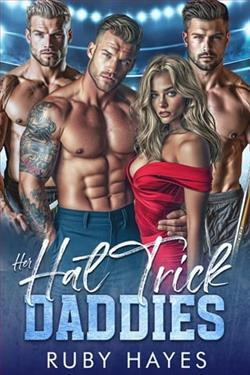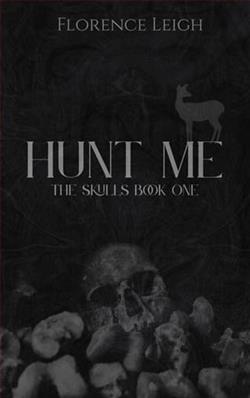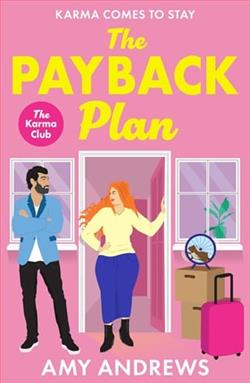Page 20 of The Woodcarver's Model
They climbed back down in near silence. Rob held Mitch’s hand even tighter as if it would prevent the moment from ending. When they reached the truck, Rob turned to face him. Their faces were inches apart.
“Thank you,” he said, and they kissed.
As the truck bumped and rocked its way back down to the main road, Rob had found the strength to speak again.
“What I felt up there, on the Peak, I haven’t felt like that in twenty years, not since I went looking for my parents when their plane crashed in Peru.”
Mitch put his hand on Rob’s thigh. “I’m so sorry.”
Rob continued, “I went down to help with the search. I was probably far more trouble than I was worth, but they let me stay. I kept wandering off from the main search party, but I never got lost, and this was in a part of the world where expert bush men could lose their way in a single turn. I never felt scared, or alone. It was as if my folks were there with me the whole time, watching over me. I felt peace like I’d never felt before. Until now.”
They drove on slowly for a few minutes, then Mitch broke the silence. “The first time I felt peace like that was when I was in the rainforest in Ucluelet on the west coast of Vancouver Island. I stood beside a seventeen-hundred-year-old tree. I remember thinking that when that tree died and toppled, it would still serve a purpose in the forest’s life, nurturing seedlings for another fifteen hundred years. Imagine making a difference for thirty-two hundred years—even Christ can’t claim that. It made me feel so insignificant. It made my problems feel even smaller.”
The truck rounded a sharp turn and Mitch slammed on the brakes. “Would you look at that? It’s perfect. Come on.” He hopped out of the truck and Rob followed.
Right on the edge of the track lay a thick tree limb. One end was partially charred.
“Lightning strike,” Mitch said. “Here, give me a hand.”
They picked it up. It felt like it weighed over two hundred pounds. As they manhandled it back to the truck, Mitch’s arm and shoulder muscles bulged under his tight shirt.No wonder he’s built that way,Rob thought, wanting nothing more than to rip that shirt off his body and lick the sweat from his iron-hard limbs. They threw it in the back of the truck.
“There. I’ll be able to make something out of that when it dries. Now, I’d better get you home so I can deal with that,” he said, pointing to Rob’s swollen crotch.
“Do we have to wait?”
“Probably not,” Mitch said, dropping to his knees.
* * * *
They pulled up to Mitch’s house.I wonder if Rufus made it back okay?Rob thought.
“One more thing to show you, then I think some food’ll be in order.” Mitch said.
“Thank God. I’m starving.”
“First, let’s grab that tree limb.”
They wrestled it out of the back of the truck and Mitch said, “This way.” About a hundred yards behind the house stood a small barn—more of a large shed, with a barn roof. This was Mitch’s workshop, the one built with his neighbours. They propped the tree limb under a large roof-covered wood pile.
“Come on. Let me show you my toys.”
“Kinky,” Rob replied.
“Is your mind always in the gutter?” Mitch laughed.
“Around you, yes.”
“Well, you’d better keep it in your pants because there are things in there that could easily take it off. Even one as big as yours.” Mitch reached back and gave Rob’s crotch a squeeze.
“Not fair!” Rob cried. “Now you’ll be to blame for anything that happens in there.”
The building was about fifteen by twenty-five feet in size, holding several large worktables and tools that Rob recognised as a wood lathe, chop saw and a belt sander. A variety of electric and manual hand tools were neatly laid out on one table. Overhead, strung from the rafters, were a series of hoses like elephant trunks which were part of the dust extraction system. Wooden bowls, Mitch’s consumer stock, filled the wall shelves. One was still on the lathe waiting to be finished. What struck Rob was just how clean and tidy this shop was. Like Mitch.
“This cost me everything I had. And it’s everything I have, other than the house and my truck. Everything I make from selling those bowls to the tourists or trading for food goes to cover expenses.” Mitch stared at the floor, looking vulnerable. “For some reason I thought you should know that.”
“You have everything you need.”
“Not quite everything,” he said in an injured tone. “Now, let me show you something I’m working on.” He moved to the back of the shop and stopped at a large tarpaulin-covered object. “I told you that I used to work in marble when I was in college. I was pretty good. People mainly, busts and hands—my favourite was one of two elderly hands clasping. I was able to capture the love of two old people in those hands, and the fear of parting, but the one thing I found was that the marble always felt cold. The people always seemed real in some ways but lacking in…life. No matter how good they were, how much people praised them, I never felt I could bring them to life. Until now.”















